MB222 Business Project: A Critical Essay on Consultants and Managers
VerifiedAdded on 2023/03/20
|7
|2104
|24
Essay
AI Summary
This essay delves into the contrasting roles of internal managers and external consultants within a business context, particularly focusing on their impact on organizational efficiency and strategic goal achievement. It highlights that both internal managers and external consultants are crucial for driving change within organizations, but they approach problem-solving from different perspectives. Internal managers, with their in-depth knowledge of the company's culture and internal workings, are contrasted with external consultants, who bring an unbiased perspective and specialized expertise. The essay explores the advantages and disadvantages of each, considering factors such as cost, project management, and the ability to implement change. It also explores the hybrid approach of utilizing both internal and external resources to maximize strengths and achieve project objectives effectively. Ultimately, the essay emphasizes the importance of aligning the choice between internal managers and external consultants with the specific needs and goals of the business project to achieve optimal outcomes.

Running Head: CRITICAL ESSAY 0
BUSINESS PROJECT
BUSINESS PROJECT
Paraphrase This Document
Need a fresh take? Get an instant paraphrase of this document with our AI Paraphraser
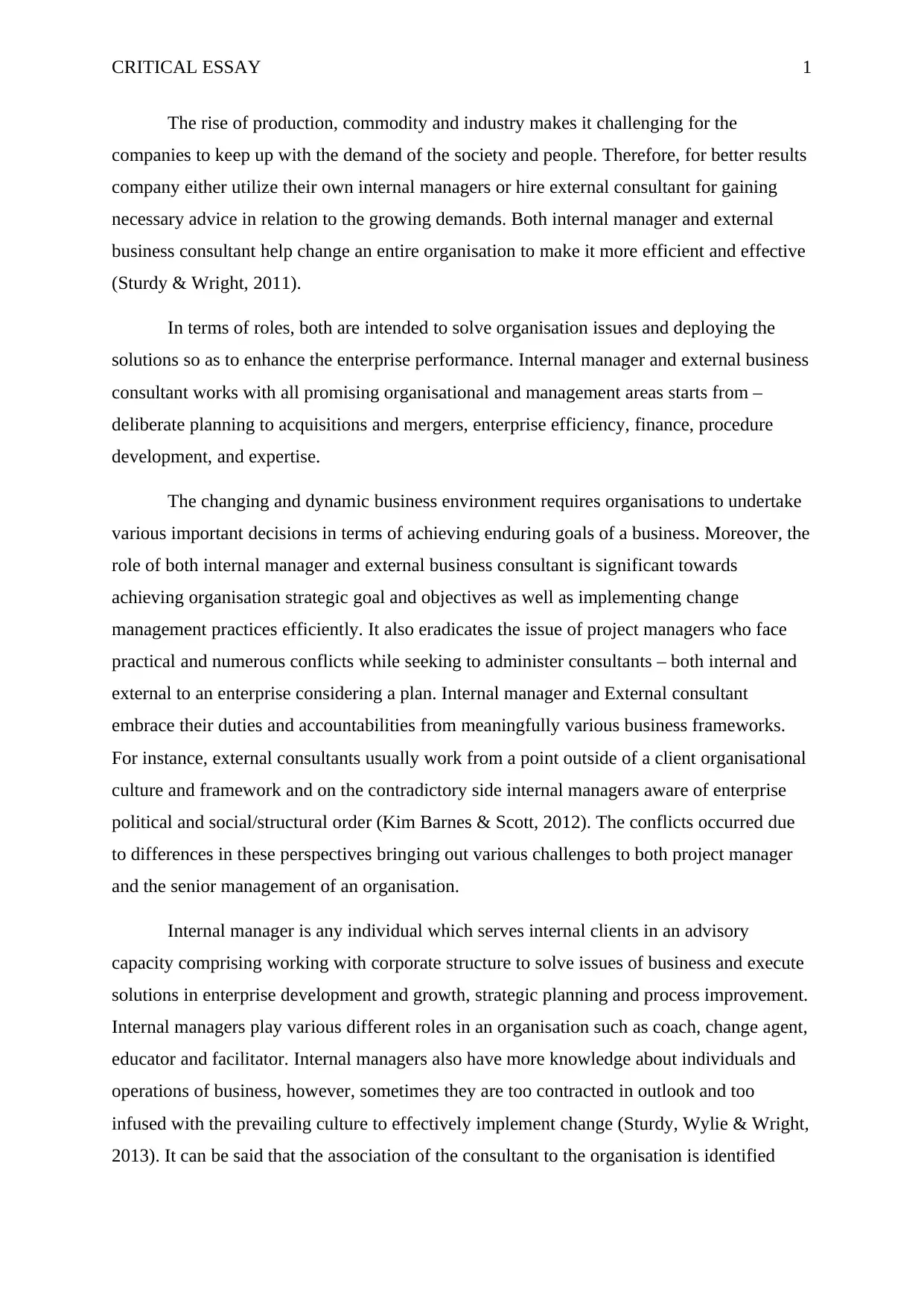
CRITICAL ESSAY 1
The rise of production, commodity and industry makes it challenging for the
companies to keep up with the demand of the society and people. Therefore, for better results
company either utilize their own internal managers or hire external consultant for gaining
necessary advice in relation to the growing demands. Both internal manager and external
business consultant help change an entire organisation to make it more efficient and effective
(Sturdy & Wright, 2011).
In terms of roles, both are intended to solve organisation issues and deploying the
solutions so as to enhance the enterprise performance. Internal manager and external business
consultant works with all promising organisational and management areas starts from –
deliberate planning to acquisitions and mergers, enterprise efficiency, finance, procedure
development, and expertise.
The changing and dynamic business environment requires organisations to undertake
various important decisions in terms of achieving enduring goals of a business. Moreover, the
role of both internal manager and external business consultant is significant towards
achieving organisation strategic goal and objectives as well as implementing change
management practices efficiently. It also eradicates the issue of project managers who face
practical and numerous conflicts while seeking to administer consultants – both internal and
external to an enterprise considering a plan. Internal manager and External consultant
embrace their duties and accountabilities from meaningfully various business frameworks.
For instance, external consultants usually work from a point outside of a client organisational
culture and framework and on the contradictory side internal managers aware of enterprise
political and social/structural order (Kim Barnes & Scott, 2012). The conflicts occurred due
to differences in these perspectives bringing out various challenges to both project manager
and the senior management of an organisation.
Internal manager is any individual which serves internal clients in an advisory
capacity comprising working with corporate structure to solve issues of business and execute
solutions in enterprise development and growth, strategic planning and process improvement.
Internal managers play various different roles in an organisation such as coach, change agent,
educator and facilitator. Internal managers also have more knowledge about individuals and
operations of business, however, sometimes they are too contracted in outlook and too
infused with the prevailing culture to effectively implement change (Sturdy, Wylie & Wright,
2013). It can be said that the association of the consultant to the organisation is identified
The rise of production, commodity and industry makes it challenging for the
companies to keep up with the demand of the society and people. Therefore, for better results
company either utilize their own internal managers or hire external consultant for gaining
necessary advice in relation to the growing demands. Both internal manager and external
business consultant help change an entire organisation to make it more efficient and effective
(Sturdy & Wright, 2011).
In terms of roles, both are intended to solve organisation issues and deploying the
solutions so as to enhance the enterprise performance. Internal manager and external business
consultant works with all promising organisational and management areas starts from –
deliberate planning to acquisitions and mergers, enterprise efficiency, finance, procedure
development, and expertise.
The changing and dynamic business environment requires organisations to undertake
various important decisions in terms of achieving enduring goals of a business. Moreover, the
role of both internal manager and external business consultant is significant towards
achieving organisation strategic goal and objectives as well as implementing change
management practices efficiently. It also eradicates the issue of project managers who face
practical and numerous conflicts while seeking to administer consultants – both internal and
external to an enterprise considering a plan. Internal manager and External consultant
embrace their duties and accountabilities from meaningfully various business frameworks.
For instance, external consultants usually work from a point outside of a client organisational
culture and framework and on the contradictory side internal managers aware of enterprise
political and social/structural order (Kim Barnes & Scott, 2012). The conflicts occurred due
to differences in these perspectives bringing out various challenges to both project manager
and the senior management of an organisation.
Internal manager is any individual which serves internal clients in an advisory
capacity comprising working with corporate structure to solve issues of business and execute
solutions in enterprise development and growth, strategic planning and process improvement.
Internal managers play various different roles in an organisation such as coach, change agent,
educator and facilitator. Internal managers also have more knowledge about individuals and
operations of business, however, sometimes they are too contracted in outlook and too
infused with the prevailing culture to effectively implement change (Sturdy, Wylie & Wright,
2013). It can be said that the association of the consultant to the organisation is identified
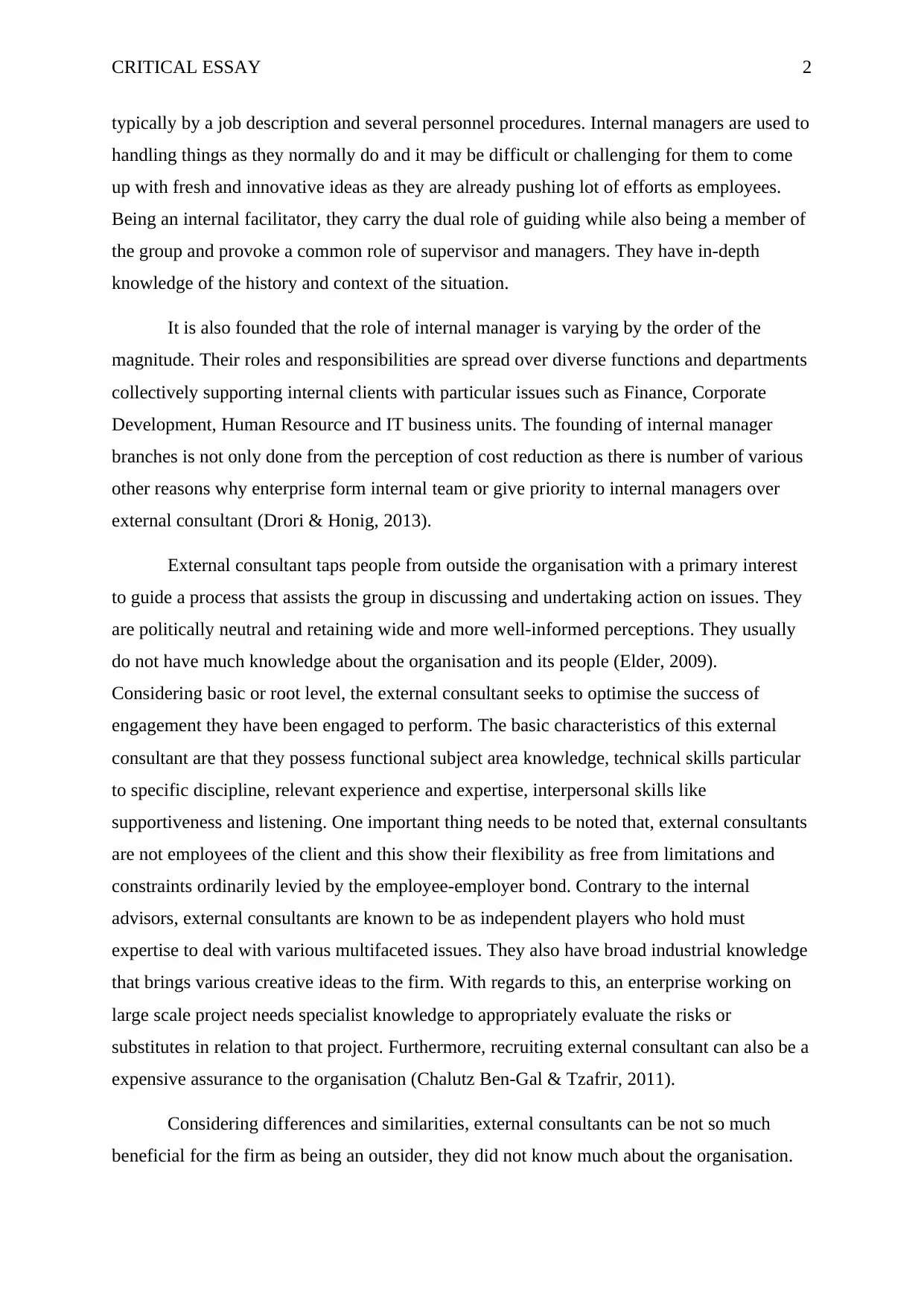
CRITICAL ESSAY 2
typically by a job description and several personnel procedures. Internal managers are used to
handling things as they normally do and it may be difficult or challenging for them to come
up with fresh and innovative ideas as they are already pushing lot of efforts as employees.
Being an internal facilitator, they carry the dual role of guiding while also being a member of
the group and provoke a common role of supervisor and managers. They have in-depth
knowledge of the history and context of the situation.
It is also founded that the role of internal manager is varying by the order of the
magnitude. Their roles and responsibilities are spread over diverse functions and departments
collectively supporting internal clients with particular issues such as Finance, Corporate
Development, Human Resource and IT business units. The founding of internal manager
branches is not only done from the perception of cost reduction as there is number of various
other reasons why enterprise form internal team or give priority to internal managers over
external consultant (Drori & Honig, 2013).
External consultant taps people from outside the organisation with a primary interest
to guide a process that assists the group in discussing and undertaking action on issues. They
are politically neutral and retaining wide and more well-informed perceptions. They usually
do not have much knowledge about the organisation and its people (Elder, 2009).
Considering basic or root level, the external consultant seeks to optimise the success of
engagement they have been engaged to perform. The basic characteristics of this external
consultant are that they possess functional subject area knowledge, technical skills particular
to specific discipline, relevant experience and expertise, interpersonal skills like
supportiveness and listening. One important thing needs to be noted that, external consultants
are not employees of the client and this show their flexibility as free from limitations and
constraints ordinarily levied by the employee-employer bond. Contrary to the internal
advisors, external consultants are known to be as independent players who hold must
expertise to deal with various multifaceted issues. They also have broad industrial knowledge
that brings various creative ideas to the firm. With regards to this, an enterprise working on
large scale project needs specialist knowledge to appropriately evaluate the risks or
substitutes in relation to that project. Furthermore, recruiting external consultant can also be a
expensive assurance to the organisation (Chalutz Ben-Gal & Tzafrir, 2011).
Considering differences and similarities, external consultants can be not so much
beneficial for the firm as being an outsider, they did not know much about the organisation.
typically by a job description and several personnel procedures. Internal managers are used to
handling things as they normally do and it may be difficult or challenging for them to come
up with fresh and innovative ideas as they are already pushing lot of efforts as employees.
Being an internal facilitator, they carry the dual role of guiding while also being a member of
the group and provoke a common role of supervisor and managers. They have in-depth
knowledge of the history and context of the situation.
It is also founded that the role of internal manager is varying by the order of the
magnitude. Their roles and responsibilities are spread over diverse functions and departments
collectively supporting internal clients with particular issues such as Finance, Corporate
Development, Human Resource and IT business units. The founding of internal manager
branches is not only done from the perception of cost reduction as there is number of various
other reasons why enterprise form internal team or give priority to internal managers over
external consultant (Drori & Honig, 2013).
External consultant taps people from outside the organisation with a primary interest
to guide a process that assists the group in discussing and undertaking action on issues. They
are politically neutral and retaining wide and more well-informed perceptions. They usually
do not have much knowledge about the organisation and its people (Elder, 2009).
Considering basic or root level, the external consultant seeks to optimise the success of
engagement they have been engaged to perform. The basic characteristics of this external
consultant are that they possess functional subject area knowledge, technical skills particular
to specific discipline, relevant experience and expertise, interpersonal skills like
supportiveness and listening. One important thing needs to be noted that, external consultants
are not employees of the client and this show their flexibility as free from limitations and
constraints ordinarily levied by the employee-employer bond. Contrary to the internal
advisors, external consultants are known to be as independent players who hold must
expertise to deal with various multifaceted issues. They also have broad industrial knowledge
that brings various creative ideas to the firm. With regards to this, an enterprise working on
large scale project needs specialist knowledge to appropriately evaluate the risks or
substitutes in relation to that project. Furthermore, recruiting external consultant can also be a
expensive assurance to the organisation (Chalutz Ben-Gal & Tzafrir, 2011).
Considering differences and similarities, external consultants can be not so much
beneficial for the firm as being an outsider, they did not know much about the organisation.
⊘ This is a preview!⊘
Do you want full access?
Subscribe today to unlock all pages.

Trusted by 1+ million students worldwide
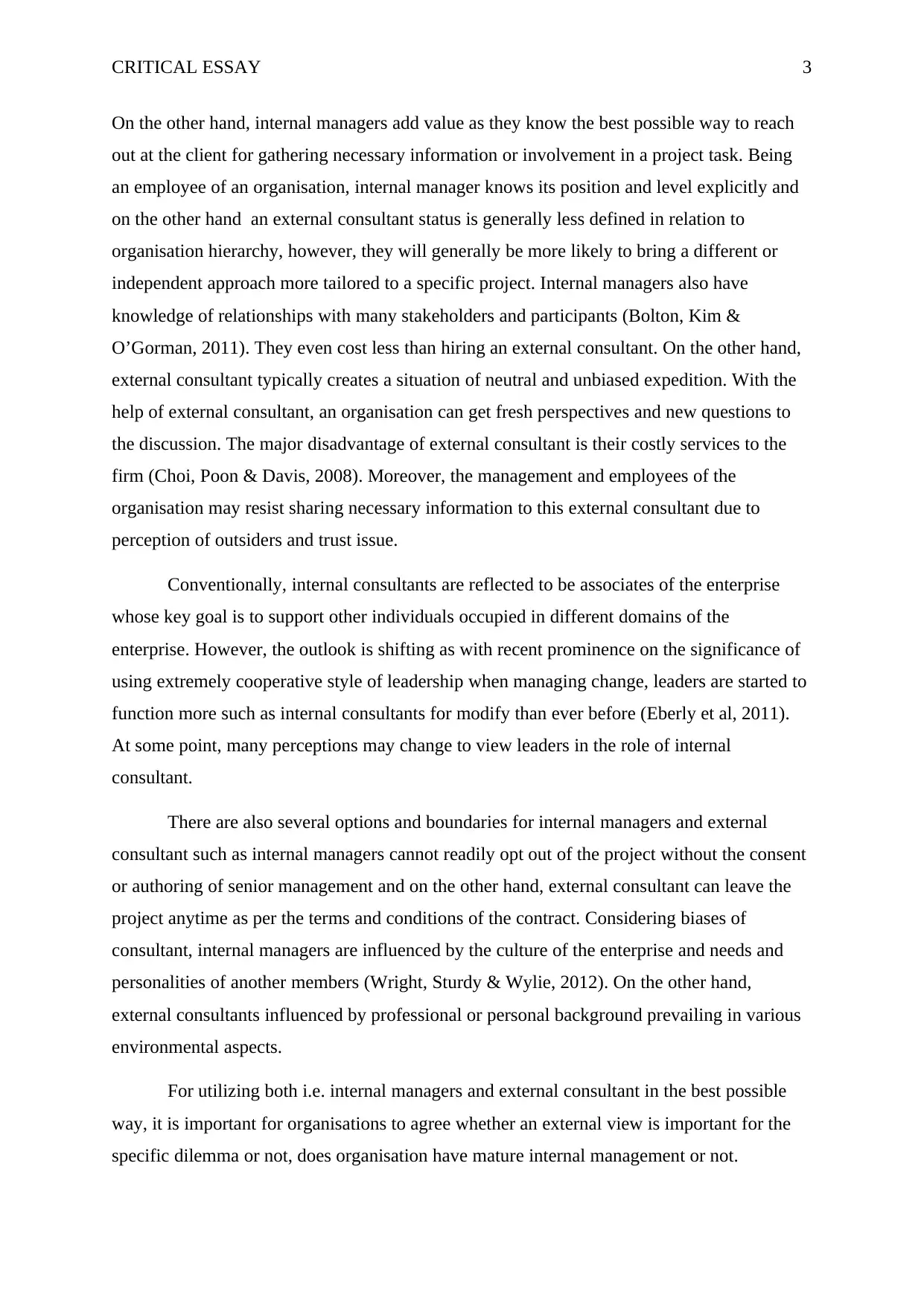
CRITICAL ESSAY 3
On the other hand, internal managers add value as they know the best possible way to reach
out at the client for gathering necessary information or involvement in a project task. Being
an employee of an organisation, internal manager knows its position and level explicitly and
on the other hand an external consultant status is generally less defined in relation to
organisation hierarchy, however, they will generally be more likely to bring a different or
independent approach more tailored to a specific project. Internal managers also have
knowledge of relationships with many stakeholders and participants (Bolton, Kim &
O’Gorman, 2011). They even cost less than hiring an external consultant. On the other hand,
external consultant typically creates a situation of neutral and unbiased expedition. With the
help of external consultant, an organisation can get fresh perspectives and new questions to
the discussion. The major disadvantage of external consultant is their costly services to the
firm (Choi, Poon & Davis, 2008). Moreover, the management and employees of the
organisation may resist sharing necessary information to this external consultant due to
perception of outsiders and trust issue.
Conventionally, internal consultants are reflected to be associates of the enterprise
whose key goal is to support other individuals occupied in different domains of the
enterprise. However, the outlook is shifting as with recent prominence on the significance of
using extremely cooperative style of leadership when managing change, leaders are started to
function more such as internal consultants for modify than ever before (Eberly et al, 2011).
At some point, many perceptions may change to view leaders in the role of internal
consultant.
There are also several options and boundaries for internal managers and external
consultant such as internal managers cannot readily opt out of the project without the consent
or authoring of senior management and on the other hand, external consultant can leave the
project anytime as per the terms and conditions of the contract. Considering biases of
consultant, internal managers are influenced by the culture of the enterprise and needs and
personalities of another members (Wright, Sturdy & Wylie, 2012). On the other hand,
external consultants influenced by professional or personal background prevailing in various
environmental aspects.
For utilizing both i.e. internal managers and external consultant in the best possible
way, it is important for organisations to agree whether an external view is important for the
specific dilemma or not, does organisation have mature internal management or not.
On the other hand, internal managers add value as they know the best possible way to reach
out at the client for gathering necessary information or involvement in a project task. Being
an employee of an organisation, internal manager knows its position and level explicitly and
on the other hand an external consultant status is generally less defined in relation to
organisation hierarchy, however, they will generally be more likely to bring a different or
independent approach more tailored to a specific project. Internal managers also have
knowledge of relationships with many stakeholders and participants (Bolton, Kim &
O’Gorman, 2011). They even cost less than hiring an external consultant. On the other hand,
external consultant typically creates a situation of neutral and unbiased expedition. With the
help of external consultant, an organisation can get fresh perspectives and new questions to
the discussion. The major disadvantage of external consultant is their costly services to the
firm (Choi, Poon & Davis, 2008). Moreover, the management and employees of the
organisation may resist sharing necessary information to this external consultant due to
perception of outsiders and trust issue.
Conventionally, internal consultants are reflected to be associates of the enterprise
whose key goal is to support other individuals occupied in different domains of the
enterprise. However, the outlook is shifting as with recent prominence on the significance of
using extremely cooperative style of leadership when managing change, leaders are started to
function more such as internal consultants for modify than ever before (Eberly et al, 2011).
At some point, many perceptions may change to view leaders in the role of internal
consultant.
There are also several options and boundaries for internal managers and external
consultant such as internal managers cannot readily opt out of the project without the consent
or authoring of senior management and on the other hand, external consultant can leave the
project anytime as per the terms and conditions of the contract. Considering biases of
consultant, internal managers are influenced by the culture of the enterprise and needs and
personalities of another members (Wright, Sturdy & Wylie, 2012). On the other hand,
external consultants influenced by professional or personal background prevailing in various
environmental aspects.
For utilizing both i.e. internal managers and external consultant in the best possible
way, it is important for organisations to agree whether an external view is important for the
specific dilemma or not, does organisation have mature internal management or not.
Paraphrase This Document
Need a fresh take? Get an instant paraphrase of this document with our AI Paraphraser
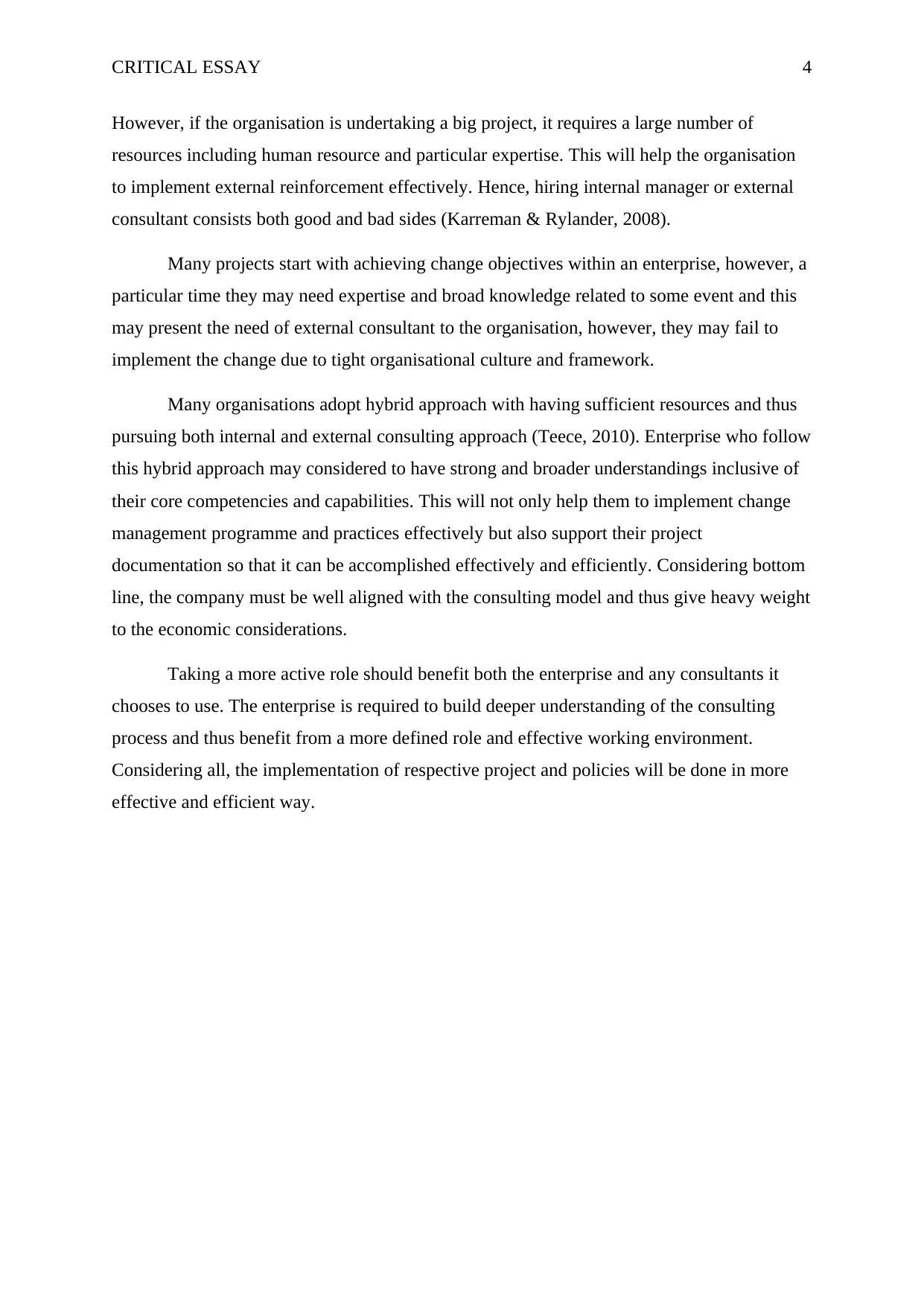
CRITICAL ESSAY 4
However, if the organisation is undertaking a big project, it requires a large number of
resources including human resource and particular expertise. This will help the organisation
to implement external reinforcement effectively. Hence, hiring internal manager or external
consultant consists both good and bad sides (Karreman & Rylander, 2008).
Many projects start with achieving change objectives within an enterprise, however, a
particular time they may need expertise and broad knowledge related to some event and this
may present the need of external consultant to the organisation, however, they may fail to
implement the change due to tight organisational culture and framework.
Many organisations adopt hybrid approach with having sufficient resources and thus
pursuing both internal and external consulting approach (Teece, 2010). Enterprise who follow
this hybrid approach may considered to have strong and broader understandings inclusive of
their core competencies and capabilities. This will not only help them to implement change
management programme and practices effectively but also support their project
documentation so that it can be accomplished effectively and efficiently. Considering bottom
line, the company must be well aligned with the consulting model and thus give heavy weight
to the economic considerations.
Taking a more active role should benefit both the enterprise and any consultants it
chooses to use. The enterprise is required to build deeper understanding of the consulting
process and thus benefit from a more defined role and effective working environment.
Considering all, the implementation of respective project and policies will be done in more
effective and efficient way.
However, if the organisation is undertaking a big project, it requires a large number of
resources including human resource and particular expertise. This will help the organisation
to implement external reinforcement effectively. Hence, hiring internal manager or external
consultant consists both good and bad sides (Karreman & Rylander, 2008).
Many projects start with achieving change objectives within an enterprise, however, a
particular time they may need expertise and broad knowledge related to some event and this
may present the need of external consultant to the organisation, however, they may fail to
implement the change due to tight organisational culture and framework.
Many organisations adopt hybrid approach with having sufficient resources and thus
pursuing both internal and external consulting approach (Teece, 2010). Enterprise who follow
this hybrid approach may considered to have strong and broader understandings inclusive of
their core competencies and capabilities. This will not only help them to implement change
management programme and practices effectively but also support their project
documentation so that it can be accomplished effectively and efficiently. Considering bottom
line, the company must be well aligned with the consulting model and thus give heavy weight
to the economic considerations.
Taking a more active role should benefit both the enterprise and any consultants it
chooses to use. The enterprise is required to build deeper understanding of the consulting
process and thus benefit from a more defined role and effective working environment.
Considering all, the implementation of respective project and policies will be done in more
effective and efficient way.
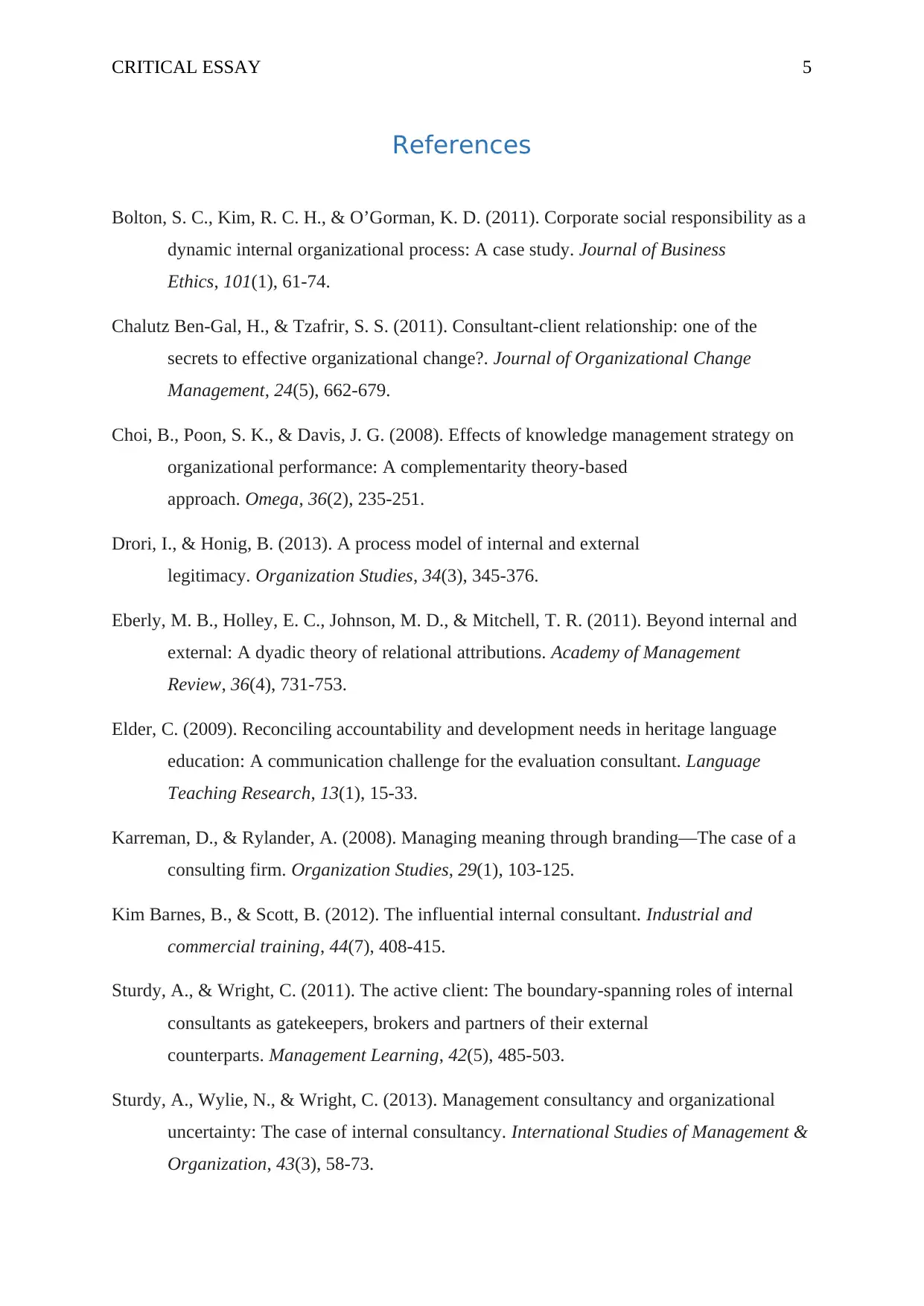
CRITICAL ESSAY 5
References
Bolton, S. C., Kim, R. C. H., & O’Gorman, K. D. (2011). Corporate social responsibility as a
dynamic internal organizational process: A case study. Journal of Business
Ethics, 101(1), 61-74.
Chalutz Ben-Gal, H., & Tzafrir, S. S. (2011). Consultant-client relationship: one of the
secrets to effective organizational change?. Journal of Organizational Change
Management, 24(5), 662-679.
Choi, B., Poon, S. K., & Davis, J. G. (2008). Effects of knowledge management strategy on
organizational performance: A complementarity theory-based
approach. Omega, 36(2), 235-251.
Drori, I., & Honig, B. (2013). A process model of internal and external
legitimacy. Organization Studies, 34(3), 345-376.
Eberly, M. B., Holley, E. C., Johnson, M. D., & Mitchell, T. R. (2011). Beyond internal and
external: A dyadic theory of relational attributions. Academy of Management
Review, 36(4), 731-753.
Elder, C. (2009). Reconciling accountability and development needs in heritage language
education: A communication challenge for the evaluation consultant. Language
Teaching Research, 13(1), 15-33.
Karreman, D., & Rylander, A. (2008). Managing meaning through branding—The case of a
consulting firm. Organization Studies, 29(1), 103-125.
Kim Barnes, B., & Scott, B. (2012). The influential internal consultant. Industrial and
commercial training, 44(7), 408-415.
Sturdy, A., & Wright, C. (2011). The active client: The boundary-spanning roles of internal
consultants as gatekeepers, brokers and partners of their external
counterparts. Management Learning, 42(5), 485-503.
Sturdy, A., Wylie, N., & Wright, C. (2013). Management consultancy and organizational
uncertainty: The case of internal consultancy. International Studies of Management &
Organization, 43(3), 58-73.
References
Bolton, S. C., Kim, R. C. H., & O’Gorman, K. D. (2011). Corporate social responsibility as a
dynamic internal organizational process: A case study. Journal of Business
Ethics, 101(1), 61-74.
Chalutz Ben-Gal, H., & Tzafrir, S. S. (2011). Consultant-client relationship: one of the
secrets to effective organizational change?. Journal of Organizational Change
Management, 24(5), 662-679.
Choi, B., Poon, S. K., & Davis, J. G. (2008). Effects of knowledge management strategy on
organizational performance: A complementarity theory-based
approach. Omega, 36(2), 235-251.
Drori, I., & Honig, B. (2013). A process model of internal and external
legitimacy. Organization Studies, 34(3), 345-376.
Eberly, M. B., Holley, E. C., Johnson, M. D., & Mitchell, T. R. (2011). Beyond internal and
external: A dyadic theory of relational attributions. Academy of Management
Review, 36(4), 731-753.
Elder, C. (2009). Reconciling accountability and development needs in heritage language
education: A communication challenge for the evaluation consultant. Language
Teaching Research, 13(1), 15-33.
Karreman, D., & Rylander, A. (2008). Managing meaning through branding—The case of a
consulting firm. Organization Studies, 29(1), 103-125.
Kim Barnes, B., & Scott, B. (2012). The influential internal consultant. Industrial and
commercial training, 44(7), 408-415.
Sturdy, A., & Wright, C. (2011). The active client: The boundary-spanning roles of internal
consultants as gatekeepers, brokers and partners of their external
counterparts. Management Learning, 42(5), 485-503.
Sturdy, A., Wylie, N., & Wright, C. (2013). Management consultancy and organizational
uncertainty: The case of internal consultancy. International Studies of Management &
Organization, 43(3), 58-73.
⊘ This is a preview!⊘
Do you want full access?
Subscribe today to unlock all pages.

Trusted by 1+ million students worldwide
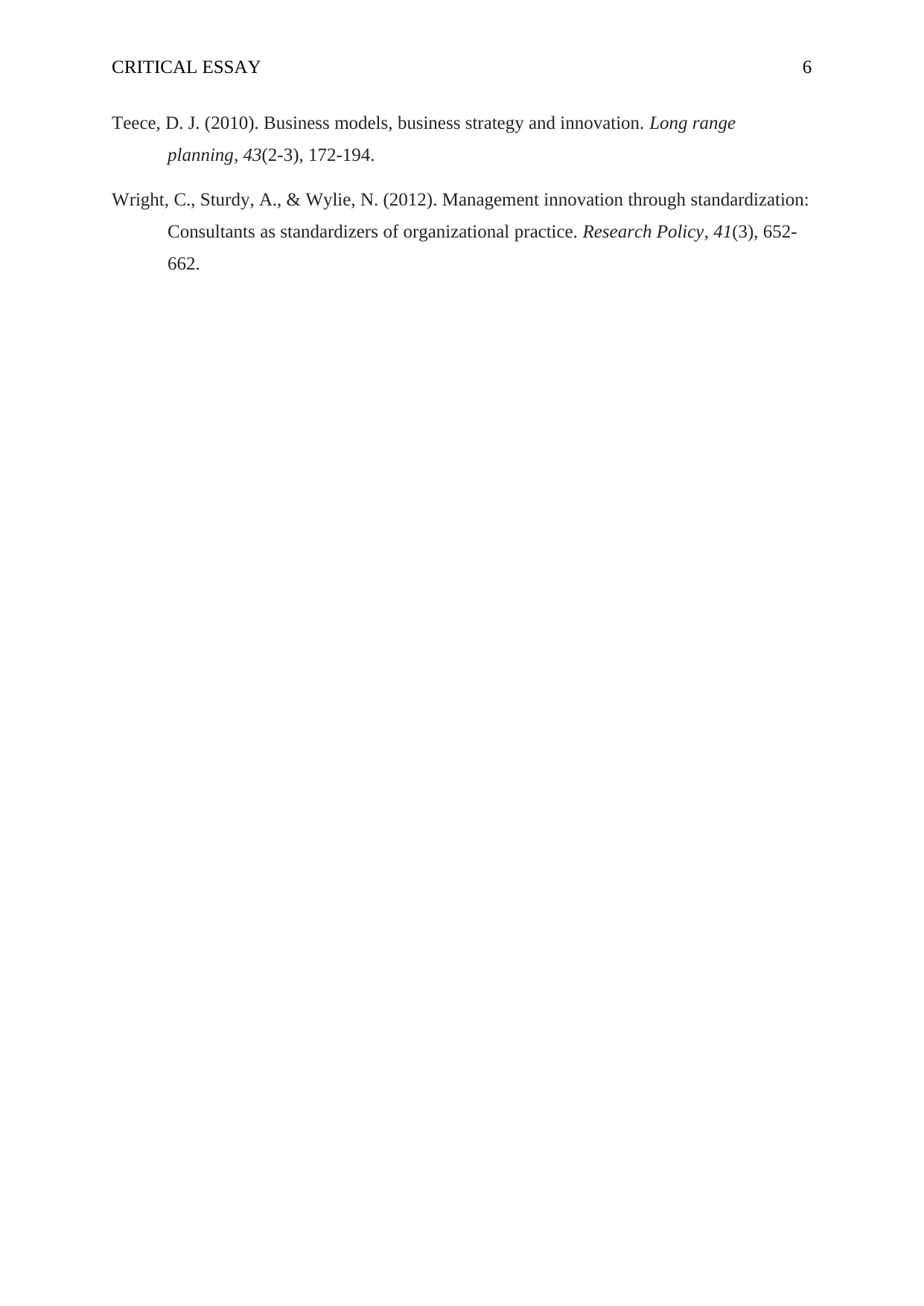
CRITICAL ESSAY 6
Teece, D. J. (2010). Business models, business strategy and innovation. Long range
planning, 43(2-3), 172-194.
Wright, C., Sturdy, A., & Wylie, N. (2012). Management innovation through standardization:
Consultants as standardizers of organizational practice. Research Policy, 41(3), 652-
662.
Teece, D. J. (2010). Business models, business strategy and innovation. Long range
planning, 43(2-3), 172-194.
Wright, C., Sturdy, A., & Wylie, N. (2012). Management innovation through standardization:
Consultants as standardizers of organizational practice. Research Policy, 41(3), 652-
662.
1 out of 7
Related Documents
Your All-in-One AI-Powered Toolkit for Academic Success.
+13062052269
info@desklib.com
Available 24*7 on WhatsApp / Email
![[object Object]](/_next/static/media/star-bottom.7253800d.svg)
Unlock your academic potential
Copyright © 2020–2026 A2Z Services. All Rights Reserved. Developed and managed by ZUCOL.





